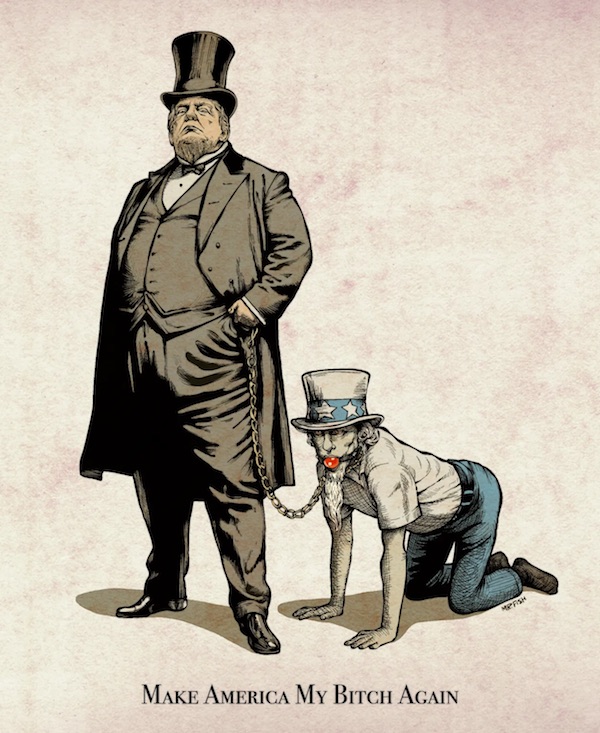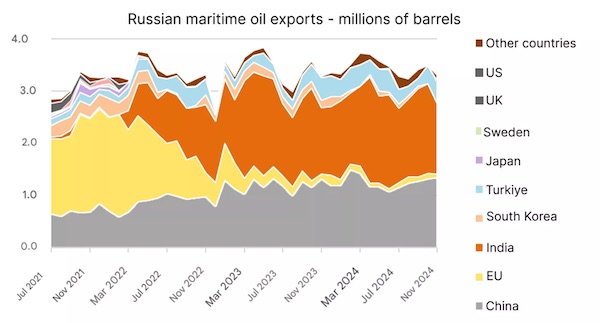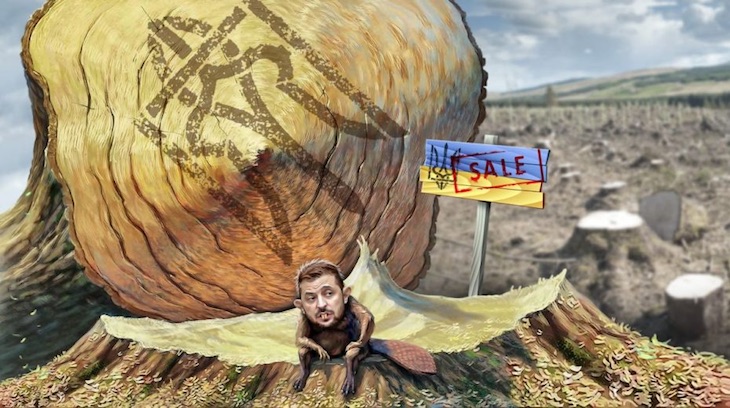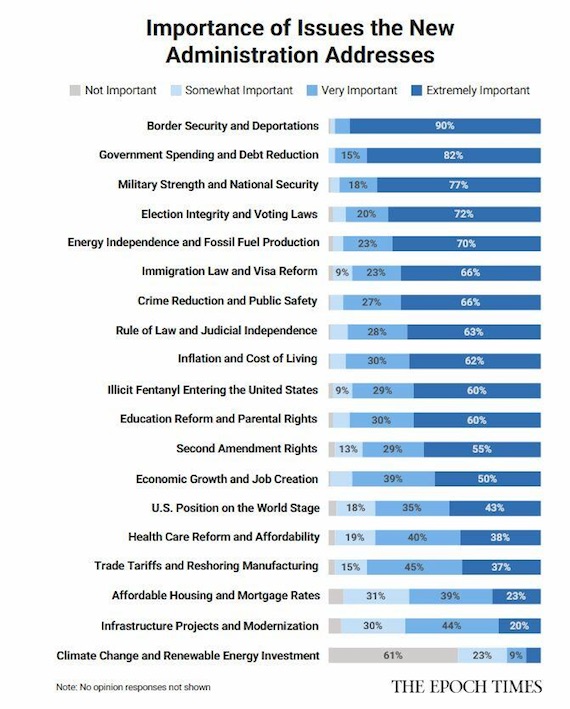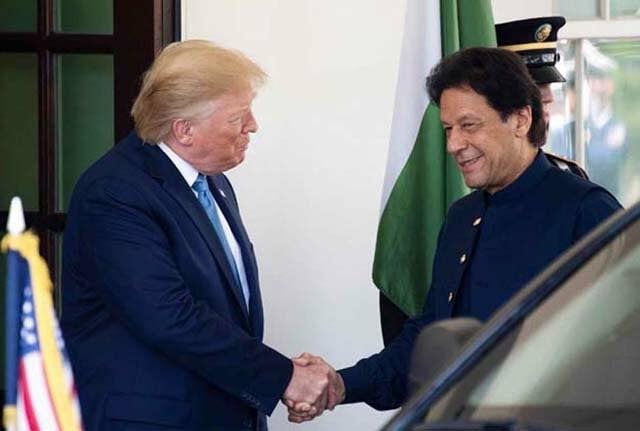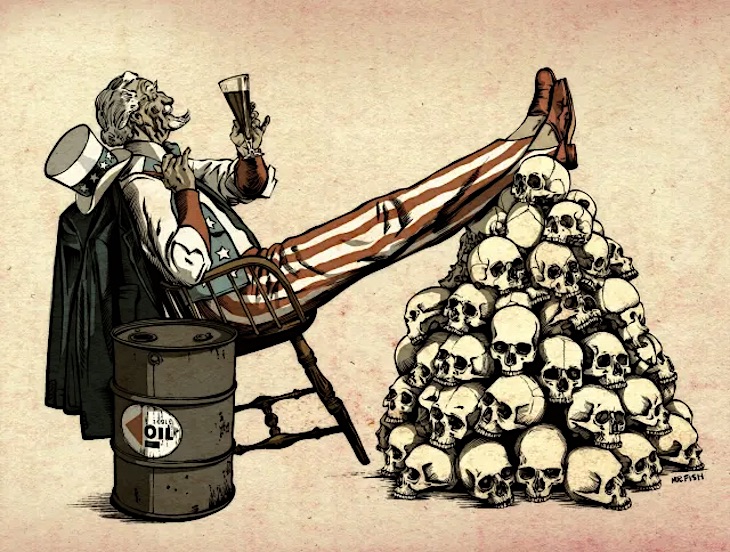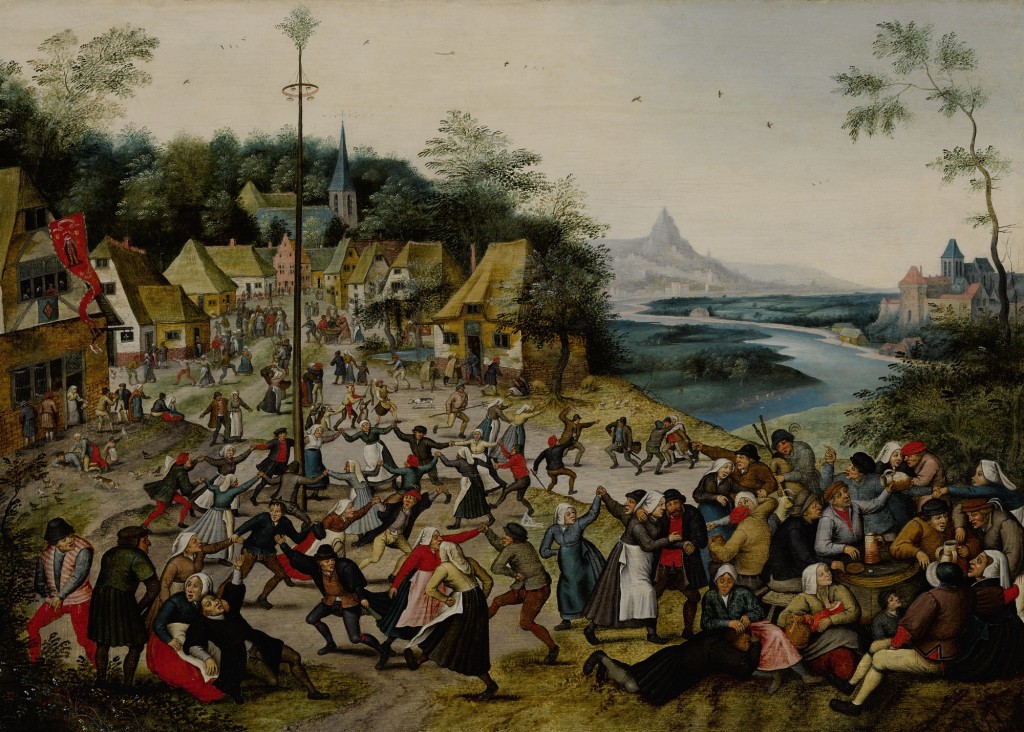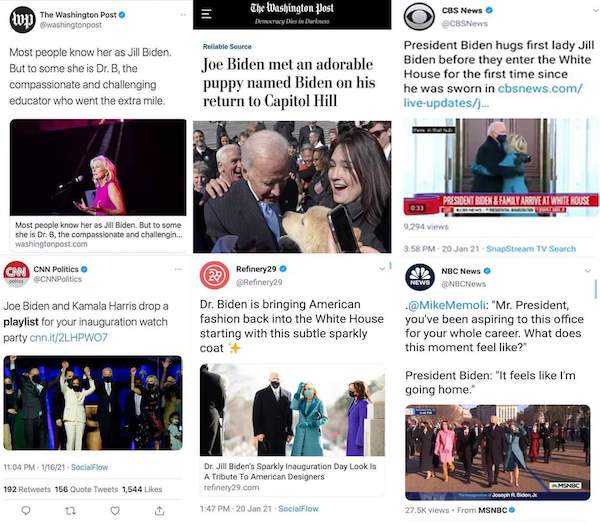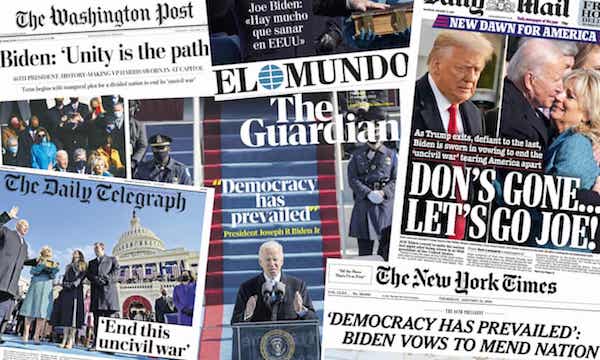
Salvador Dali The ghost of Vermeer of Delft which can be used as a table 1934

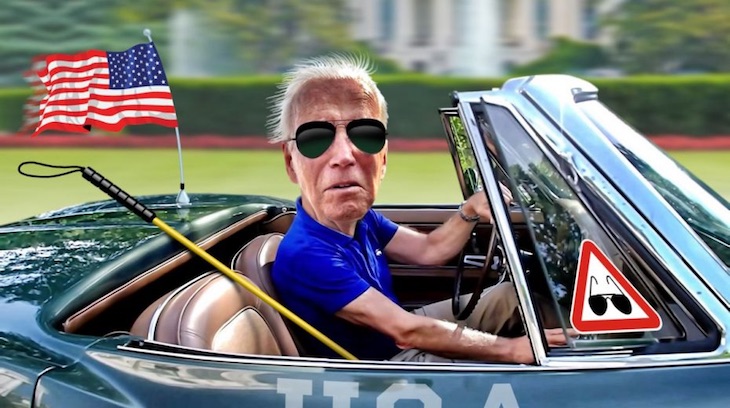

Still waiting for the "science" predictions that never occur. Trump just saved the US $1 trillion annually…
Trump Takes US Out of Paris Climate Agreement With New Executive Orders
Source: Bloomberg Television pic.twitter.com/KmhEblD81Z— Camus (@newstart_2024) January 21, 2025
Signing
BREAKING: President Trump just signed a flurry of Executive Orders publicly at the Capital One Area including:
-Recision of 78 Biden Era Executive Orders
-Freeze federal regulations
-Freeze on federal hiring
-Federal workers must return to full-time in-person work immediately… pic.twitter.com/Y7eWr6XlOH— Libs of TikTok (@libsoftiktok) January 21, 2025
MSNBC
The panel at MSNBC looks like someone just kicked their dog. Each of them know that they've been complicit in running cover for the most corrupt administration in our nations history.
Thoughts from independent journalists? @MSNBC @Morning_Joe @walterkirn @mtaibbi @TheFP… pic.twitter.com/evMMsoyHQo— Evans Wroten (@Evans_Wroten) January 20, 2025
Gutfeld
Thanks to @greggutfeld for shoutout.
Joe Biden’s entire reason for running – the “fine people” hoax – was always a lie, and millions suffered because of it.
But that all ended today. Thank heavens for President Trump. #47
@ScottAdamsSays @joelpollak pic.twitter.com/ezcm2QcRZS
— Steve Cortes (@CortesSteve) January 20, 2025
Lutnick
The seeds are being planted…
The IRS and Income Tax is COMING TO AN END in America!
The External Revenue Service was the first step to achieve this goal.
Oh my God… it’s really happening.
Howard Lutnickhttps://t.co/7HpQmyG887 pic.twitter.com/WUPFHfHqZi
— MJTruthUltra (@MJTruthUltra) January 20, 2025
Warren and Maddow lost bigly
I just got back from Donald Trump's inauguration.
If it's any indication of what Trump's second term will look like, it'll be great for his billionaire donors and giant corporations, and pain and costs for everyone else. pic.twitter.com/EFkhrIGc7l
— Elizabeth Warren (@SenWarren) January 20, 2025
MSNBC started the lies immediately because they have learned nothing.
So let’s debunk a common mainstream media talking point.
We built the Panama Canal. We paid for the Panama Canal. We gave the Panama Canal to Panama and we signed a treaty that says it was going to be… pic.twitter.com/uSCw2euN4n
— Insurrection Barbie (@DefiyantlyFree) January 20, 2025
Pardons
Nearly 3 minutes straight of Democrats saying preemptive presidential pardons means you’re guilty:
Biden just preemptively pardoned Fauci, Milley, Jan 6th committee, and his family. pic.twitter.com/Bjg0fkgvb3
— Libs of TikTok (@libsoftiktok) January 20, 2025


“Trump vowed to measure US strength by “the wars we end and, more importantly, wars we never get into.”
• Donald Trump Sworn In As 47th US President (RT)
Donald J. Trump has taken the oath of office as the 47th president of the United States, administered by Chief Justice of the US Supreme Court John Roberts. Trump was sworn in inside the US Capitol Rotunda, to the sounds of the presidential fanfare ‘Hail to the Chief’. Moments earlier, Vice President J.D. Vance took the oath of office as well, administered by Supreme Court Justice Brett Kavanaugh. In his inauguration speech, Trump said his election is a mandate to “completely and totally reverse” the “many betrayals that have taken place,” over the last four years. “From this moment on, America’s decline is over,” he said. “The journey to reclaim our Republic has not been an easy one. Those who wish to stop our cause, have tried to take my freedom and indeed my life,” he added, referring to the attempt on his life during a campaign rally in Butler, Pennsylvania last July.
“I was saved by God to make America great again,” Trump declared. As was expected, Trump said he will sign a slew of executive orders on his first day in office, promising a “revolution of common sense.” He also promised to declare a “national emergency on our southern border” and send troops to “repel the disastrous invasion of our country.” “All illegal entry will immediately be halted” and “millions and millions of criminal aliens” will be sent “back to where they came from.” On foreign policy, Trump vowed to measure US strength by “the wars we end and, more importantly, wars we never get into.”
“My proudest legacy will be of a peacemaker and a unifier.” Trump also said he will declare a national energy emergency, promising to “drill, baby drill.” He also directed all cabinet members to use their powers to defeat record inflation and bring down costs and prices. On gender politics, Trump declared: “There are only two genders: male and female.” This will become “official policy of the United States government,” he said. The 47th president also assured Americans that he will end all government censorship, “bring back free speech to America” and “forge a society that is color-blind and merit-based.”

“..a step towards “national reconciliation.”
• Trump Pardons 1,500 January 6 “Rioters” (RT)
US President Donald Trump has pardoned around 1,500 people involved in the storming of the Capitol building in 2021. Trump signed an executive order granting pardons in the Oval Office on Monday, hours after he was sworn in for his second term. The president granted “a full, complete and unconditional pardon to all other individuals convicted of offenses related to events that occurred at or near the United States Capitol on January 6, 2021,” the order said. Additionally, 14 people got their sentences commuted. “We hope that they come out tonight, frankly,” Trump told reporters in the Oval Office.
Trump instructed the attorney general to dismiss “all pending indictments” related to the riot. He described the pardons as a measure to rectify “a grave national injustice” and a step towards “national reconciliation.” On January 6, 2021, a group of Trump supporters broke through security barriers and briefly overran the Capitol building, hoping to disrupt the certification of Joe Biden’s victory in the 2020 presidential election. While some intruders were non-violent, others fought with police officers and destroyed property. One rioter, Ashli Babbitt, was fatally shot by police when she attempted to enter the Speaker’s Lobby.
Trump has never recognized that he lost the 2020 election to Biden, claiming that the vote was rigged. He described the January 6 defendants as patriots and hostages, insisting that their prosecution was politically motivated. The Democrats accused Trump of inciting the riot and impeached him in 2021, citing his role in the incident. Trump has denied any wrongdoing, dismissing the accusations as a “witch hunt.” According to The Hill, the pardon applies to Enrique Tarrio, the former leader of the right-wing Proud Boys group who is currently serving a 22-year prison term. His lawyer told the publication that Tarrio was being “processed out” of prison.
The Biden DOJ prosecuted peaceful January 6th protestors under fraudulent and manufactured pretenses.
I was one of them.
Trump set us free. pic.twitter.com/IpPJr2cczh
— Dr. Simone Gold (@drsimonegold) January 21, 2025

“We have a lot of failures to fix and that requires a committed team focused on the same goals..”
• Host of Senior Diplomats Get Marching Orders as Trump Purges State Dept (Sp.)
During his campaigning and after his election win, Donald Trump has repeatedly vowed to “demolish the deep state,” overhaul federal departments and agencies, and “clean out the corrupt actors.” A host of senior career diplomats are quitting the State Department as Donald Trump makes a clean break with the Joe Biden administration, The Washington Post reported. The resignations, effective at noon on Monday, just before the inauguration, were on instructions from Trump’s aides, claimed unnamed US officials. Trump has authorized over 20 “senior bureau officials” to take over vacated posts, with some of the newcomers having formerly served in key roles during his first term, insiders added.
Among those departing are John Bass, the under secretary for management and acting undersecretary for political affairs, Geoff Pyatt, the assistant secretary for energy resources, and top diplomat for East Asia, Dan Kritenbrink.
The Trump team made clear the marching orders were not personal, said one resigning diplomat. “It is entirely appropriate for the transition to seek officials who share President Trump’s vision for putting our nation and America’s working men and women first. We have a lot of failures to fix and that requires a committed team focused on the same goals,” a spokesperson for the transition team said.

The election proved that Americans don’t want tampons in men’s bathrooms, or guys in girls’ dorms.
• Trump Rolls Back Transgender Rights and DEI (RT)
President Donald Trump has signed two executive orders reversing protections for transgender rights and diversity, equity, and inclusion (DEI) programs, established during former President Joe Biden’s administration. The move, announced on Trump’s first day back in office, drew an immediate backlash from civil rights groups. One of the orders, titled “Defending Women from Gender Ideology Extremism and Restoring Biological Truth to the Federal Government,” directs federal agencies to remove policies supporting gender identity protections. The order asserts that “there are only two genders, male and female” and mandates agencies to update official documents such as passports and visas accordingly. It also prohibits taxpayer funding for gender transition services in prisons. Trump highlighted the order during his inaugural address.
The executive order states: “Efforts to eradicate the biological reality of sex fundamentally attack women by depriving them of their dignity, safety, and well-being. The erasure of sex in language and policy has a corrosive impact not just on women but on the validity of the entire American system.” The second order overturns Biden’s 2021 executive action, which required federal agencies to review policies that could negatively affect transgender individuals. Instead, Trump’s directive calls for a review of diversity and equity initiatives, which he described as discriminatory. The review could result in the termination of environmental justice grants, diversity training, and other similar programs.
Civil rights groups swiftly condemned the measures. “We refuse to back down or be intimidated… We will fight back against these harmful provisions with everything we’ve got,” Kelley Robinson, president of the Human Rights Campaign, said in a statement. Asian Americans Advancing Justice, a prominent advocacy organization, also criticized the rollback, vowing to protect vulnerable communities and continue fighting discrimination.
These changes reflect a broader national trend. While some corporations have scaled back DEI programs, companies such as Costco and Apple remain committed to diversity policies. At the same time, others, including Meta, McDonald’s, and Walmart, have significantly reduced their DEI initiatives. Meta recently dismantled its DEI department, citing a shifting legal and policy landscape. McDonald’s has scaled back diversity targets for senior leadership, and Walmart has announced plans to retire certain diversity terms and initiatives. The Trump administration framed the policy changes as an effort to remove perceived bias in government initiatives. Rights organizations have threatened to challenge the orders through court action and public advocacy.

Free speech returns.
• Trump Signs Executive Order Against ‘Censorship’ (RT)
US President Donald Trump has signed an executive order banning government officials from violating freedom of speech under the guise of fighting misinformation. Trump signed a flurry of orders hours after he was sworn in as the 47th president on Monday. In the document, Trump accused his predecessor, Joe Biden, of “censoring Americans’ speech on online platforms” and pressuring social media companies to “moderate, deplatform, or otherwise suppress speech that the federal government did not approve.”
“Under the guise of combatting ‘misinformation,’ ‘disinformation,’ and ‘malinformation,’ the federal government infringed on the constitutionally protected speech rights of American citizens across the United States in a manner that advanced the government’s preferred narrative about significant matters of public debate. Government censorship of speech is intolerable in a free society,” the document says. Trump tasked the authorities to “ensure that no federal government officer, employee, or agent engages in or facilitates any conduct that would unconstitutionally abridge the free speech of any American citizen.”
Trump’s allies have long accused the government of wielding its power to silence dissenting views online, especially during the Covid-19 pandemic and the 2020 presidential election. In 2020, Twitter and Facebook briefly cracked down on the sharing of a New York Post story about Hunter Biden’s laptop. Republicans described the incident as an act of censorship. Internal communication published by tech billionaire Elon Musk, who bought Twitter in 2022 and renamed it to X, revealed that the FBI had asked Twitter to take down accounts it said were spreading election misinformation. Facebook owner Mark Zuckerberg said earlier this month that the authorities had pressured his platform to delete materials that were deemed Covid misinformation, including memes about vaccination.

“Donald Trump’s “madman” strategy continues to defy conventional wisdom, forcing even his fiercest critics to play along.”
• The ‘Madman Strategy’: The Secret Behind Trump’s Foreign Policy (Ryumshin)
Donald Trump certainly knows how to grab attention. The new US president has entered the 2025 political season like a bull in a china shop. In less than a month, Trump and his team have managed to rattle Canada, Mexico, and Panama. But while these moves could be dismissed as political trolling, it’s Denmark that’s really on edge. Overnight, Greenland, previously regarded as a remote, unremarkable landmass, has become the crown jewel of Trump’s imperial ambitions. Reports from US media insiders suggest Trump is “100% serious” about his intention to grab the island. The president-elect has even hinted at taking the island by force if Denmark refuses to sell. This has sparked a flurry of debates in the American press, with even Trump’s detractors weighing the military capabilities of America and Denmark and calculating the potential benefits of controlling Greenland.
Naturally, theories abound as to why Trump is so fixated on this land. Broadly, these explanations fall into three categories. First, Greenland might be part of Trump’s larger, yet unclear, plan for a geopolitical reordering of the world. Second, Greenland’s rare earth metals and its strategic Northwest Passage – a North American counterpart to Russia’s Northern Sea Route – could give the US a critical edge over China. Finally, skeptics argue that Trump’s obsession with Greenland is nothing more than a personal whim, fueled by his desire to secure a place in history. Trump’s penchant for “bigger,” “greater,” and “brighter” projects certainly fits the narrative. What could be more monumental than securing the largest territorial acquisition in modern history?
Colonizing Mars is Elon Musk’s business, but annexing Greenland – now that’s a legacy-defining move. However, this theory falters when considering the practical implications of such a move. What’s the point of annexing Greenland? The US already maintains a military presence in the Arctic. Greenland’s resources could be accessed through negotiations with Denmark, likely at a much lower cost than outright control. And the geopolitical fallout would be immense. Whether or not the EU retaliates, NATO – already strained – would be effectively dismantled. A rift between the US and Western Europe could push the EU closer to Russia or even China, severing access to critical overseas markets and military infrastructure. For a president promoting the philosophy of Make America Great Again, such risks seem counterproductive.
A more plausible explanation is that Trump doesn’t actually intend to annex Greenland but rather aims to increase American control over its resources and strategic location without formal acquisition. To achieve this, Trump is deploying his signature “madman” strategy. Consider the famous scene from the Russian TV series Streets of Broken Lights, where Anatoly Dukalis, pointing a machine gun at criminals, shouts, “I’m a fool, I served in Afghanistan! Drop your weapons!” The criminals comply, not because Dukalis is actually insane, but because he convincingly pretends to be. Trump’s approach is remarkably similar. Over the years, the American media has cultivated his image as an erratic, dangerous madman. To many, the phrase “crazy idiot” is now synonymous with Donald Trump.
Remarkably, this “madman” strategy works. By playing into expectations that he’s unpredictable and willing to do the unthinkable, Trump forces his adversaries to make concessions. During the campaign, Trump threatened to crack down on social media and jail journalists he deemed unfair. After his victory, he appointed Brendan Carr to head the Federal Communications Commission. Carr promptly vowed to dismantle companies censoring their platforms. On January 11, Mark Zuckerberg gave a tearful interview to Joe Rogan, detailing how the Biden administration suppressed free speech and pleading for Trump’s protection against European censors. In the case of Greenland, Trump has done little more than make provocative statements. Yet Danish officials are already reaching out to his team, proposing to expand US bases on the island and expressing a readiness for dialogue to avoid losing their territory. It wouldn’t be surprising if Denmark now offers Washington significant concessions. If this is where it ends, Greenland could go down as one of the most audacious political scams in modern history.
The geopolitical implications of Trump’s gambit are significant. The island’s rare earth metals are crucial for high-tech industries, and control of the Northwest Passage could alter global trade routes. However, the most important outcome might be the impact on NATO. A serious rift would mark the end of the alliance as we know it. The irony of Trump’s strategy is that it relies on the very media narratives that portray him as a threat to the Western world order. By leveraging his reputation as an unpredictable “psychopath,” Trump is reshaping the global chessboard in ways that his predecessors never could. The story of Greenland’s annexation may remain unfinished, but one thing is clear: Donald Trump’s “madman” strategy continues to defy conventional wisdom, forcing even his fiercest critics to play along.

Crime family.
• Joe Biden Issues Last Minute Family Pardon (RT)
Outgoing US President Joe Biden used his last moments in office to roll out a blanket pardon for members of his family, effectively shielding them from potential repercussions they could face under Donald Trump. Biden claimed on Monday that his family has long been targeted in a concerted effort to harm him politically. “My family has been subjected to unrelenting attacks and threats, motivated solely by a desire to hurt me – the worst kind of partisan politics. Unfortunately, I have no reason to believe these attacks will end,” Biden said in a statement. The pardon concerns “any nonviolent offences against the United States” five of Biden’s family members might have committed starting from January 1, 2014 to the end of his term as president.
“I am exercising my power under the Constitution to pardon James B. Biden, [his wife] Sara Jones Biden, [first sister] Valerie Biden Owens, [her husband] John T. Owens, and [first brother] Francis W. Biden,” the outgoing president said, adding that the “pardons should not be mistaken as an acknowledgment that they engaged in any wrongdoing.” The pardon effectively buries the years-long James Biden influence peddling affair, being probed by Congressional Republicans and journalists. While he did not face any criminal charges, Biden’s brother James, a former nightclub owner, broker and political consultant, has been accused by Republicans of lying to Congress, as well as acting as an unregistered foreign agent.
James and the president’s son, Hunter, were subpoenaed over the alleged involvement of President Biden in their business dealings in the US and abroad, namely in China and Ukraine. Hunter Biden was pardoned by his father late last year, months after his conviction on gun and tax charges and as he faced sentencing in a separate case. The controversial pardon came despite Joe Biden’s repeated promises not to intervene in his son’s criminal cases.

What Paul Thacker appears to miss (or is it me?): His pardon is federal. At state level he can still be charged.
• Despite Biden Pardon, Fauci Still Faces Legal Perils (Thacker)
President Biden’s pardon of Dr. Anthony Fauci may protect the former National Institutes of Health official from immediate criminal prosecution, but some critics say he is not completely out of legal jeopardy and that public sentiment might still condemn the man who became known during the COVID-19 pandemic as “Mr. Science.” In the days before Biden offered the pardon to Fauci, along with other critics of Donald Trump, some experts who have followed Fauci’s career and handling of the pandemic, as well as members of the Trump transition team, reiterated their assertion that Fauci perjured himself on several occasions during the pandemic – especially regarding his agency’s links to the lab in Wuhan, China, that might have created the virus that causes COVID-19. The pardon addresses any COVID-related offenses, and is backdated to 2014—the year a U.S. ban on so-called “gain of function” virus research took effect — research Fauci is accused of outsourcing to China.
Despite reporting that Trump is bent on revenge, the appetite among MAGA appointees for holding Fauci accountable hasn’t been particularly vocal. But former Senate investigator Jason Foster, who now runs the whistleblower nonprofit Empower Oversight, says that Biden’s pardon creates new legal jeopardy for Fauci. Sen. Rand Paul has vowed to continue investigating the COVID origins question, and sources tell RealClearInvestigations that Sen. Ron Johnson and House Republican investigators plan to do so as well. When testifying in those inquiries or answering written depositions, Fauci will be unable to dodge questions by invoking his Fifth Amendment protections against self-incrimination. “They can ask him if he lied before, replough old ground,” Foster said. “And if he lies about any prior lie, he can be prosecuted for that or held in contempt.”
Andrew Noymer, associate professor of population health and disease prevention at the University of California, Irvine, said such hearings are necessary for scientific and historical reasons. “I’m hopeful that he will now come clean about everything he knows about the origins of the virus,” Noymer said. “For the sake of public trust in science – explaining what killed 20 million people – that a complete account is much more important than speculation about what criminal penalties he may have avoided.” “These pardons will not stop Department of Justice investigations,” said one adviser to the Trump transition team, who spoke on the condition of anonymity. “We expected this and look at it as a predicate to get truth from people who can no longer use the Fifth Amendment. Now we can bring every one of them in front of a grand jury.”
There is no consensus on Fauci’s handling of the pandemic. Legacy media outlets have promoted Fauci throughout the pandemic as “America’s doctor” who “sticks to the facts” and applauded him as “the nation’s top infectious disease expert.” When he retired from the NIH after five decades in 2022, the New York Times granted him space on its opinion page to advise the next generation of scientists, citing his own accomplishments.
Numerous social media outlets have provided a polar opposite perspective. Several X accounts have uploaded videos that show Fauci’s inconsistencies. For example, Fauci claimed in early 2022 interviews that he never recommended lockdowns, but later said he recommended shutting the country down. Independent journalist Matt Orfalea circulated another set of clips that show Fauci claiming he kept an “open mind” about how the pandemic started while alleging in others that the evidence points against a lab accident and “strongly” in favor of a natural spillover. As Fauci’s flip-flops generated attention in Republican circles and on social media, he charged that such criticism was “totally preposterous,” adding, “Attacks on me, quite frankly, are attacks on science.”

“I would have done it sooner, but … you have to get into the office.”
• Russia Congratulates Trump – Putin (RT)
Russia congratulates Donald Trump on taking office as US president and welcomes his proclaimed intent to resume contacts between the two countries, Vladimir Putin has said, during a meeting of the country’s National Security Council on Monday. “We’re hearing the statements of the newly elected US president and members of his team about the desire to restore direct contacts with Russia, which were halted by the outgoing administration. We also hear his statement about the need to do everything to prevent world war three,” Putin said. “Of course, we welcome such an attitude and congratulate the elected US president on taking office,” he added. Moscow has never “refused dialogue” with Washington and has always expressed readiness to deal with any US administration, the president noted. Russia remains committed to its principles and believes the dialogue must be built upon “equal and mutually respectful basis,” Putin emphasized.
Trump has repeatedly signaled his intent to engage in talks with Putin, particularly with the aim of bringing the conflict between Russia and Ukraine to an end. Last week, the incoming US president announced he planned to meet with Putin “very quickly” after getting sworn in. “I know he [Putin] wants to meet, and I’m going to meet very quickly,” Trump said last Monday. “I would have done it sooner, but … you have to get into the office.” Any potential in-person meeting between the two leaders is expected to be preceded by a phone talk. Moscow has repeatedly signaled its readiness to communicate with the incoming administration. According to the Kremlin, however, no exact details on when or where a potential meeting would take place have been ironed out.

“..Lavrov said that the outgoing administration was trying to “spoil the whole thing for the next administration before the end of their mandate.”
• Lavrov Weighs In On Trump’s Return To White House (RT)
The new US administration’s policies will largely determine the world order, Russian Foreign Minister Sergey Lavrov said on Monday. Moscow is open to contact with Washington, according to the top diplomat. Lavrov made the remarks during a meeting of the Russian National Security Council hosted by President Vladimir Putin. The Russian FM stated that in light of Donald Trump’s return to the White House as the 47th US president, speculation is growing about his influence on the Middle East and Ukraine conflicts, among other issues. “Therefore, much depends on the US, first of all, because the Europeans and Asian allies of the US – Australia, Japan, South Korea, New Zealand – are fully oriented to the position of the White House, and in this sense, they are waiting to see what this position will be in its final form,” Lavrov explained.
The minister also said that it remains unclear whether Trump’s promises will coincide with his actions. Trump has repeatedly vowed to bring an end to ongoing conflicts and has criticized the Biden administration for policies that he claimed led to the escalation of global tensions and pushed the world closer to the brink of World War III. Last week, while discussing the transition in Washington, Lavrov said that the outgoing administration was trying to “spoil the whole thing for the next administration before the end of their mandate.” He denounced the perceived sabotage as inappropriate “from the moral point of view.” Trump has also signaled his intent to engage in talks with Putin, particularly with the aim of bringing the Ukraine conflict to an end.
He has described the hostilities between Moscow and Kiev as a product of President Biden’s diplomatic blunders, which he said had had serious repercussions for all parties, including the US. Last week, Trump announced that he planned to meet with Putin “very quickly” after getting sworn in. On Monday, the Russian leader expressed good wishes for Trump ahead of the inauguration and said that Moscow “welcomes” his statements about wanting to restore relations with Russia and prevent the proxy conflict over Ukraine from developing into a world war. Putin and Trump have met several times in the past, the last occasion being at the 2019 G20 summit in Japan.

Jim was overtaken by developments.
• Another Door Opens (Kunstler)
Thus spake one Shawn McCreesh of The New York Times, America’s all-wise, all-knowing font of everlasting rectitude. But to answer his question, why blah blah: Donald Trump is glaring because he means bidness. His bidness is to shift the paradigm on the mendaciously sanctimonious managerial class of the USA, of which The New York Times is the principal mouthpiece. DJT looks stern, does he? All that really tells you is how nervous the Old Gray Lady is. A million or more brains, from sea to shining sea are about to get vacuumed out and redecorated. Readers of The New York Times — in their various C-suites, ivory towers, ateliers, yoga parlors, tasting rooms, bioweapon labs, and other haunts — remain utterly baffled about what is to begin today. No amount of ‘splainin’ seems to suffice.
They behold the Golden Golem of Greatness (DJT) doing his dance onstage behind the cop, the Indian chief, and the cowpoke and all they can really see are their own careers going up in smoke (along with vested pensions, reputations, possibly even chattels, marriages, and health). As I write, long before dawn, “Joe Biden” remains President of the US. You must wonder, as the hours dwindle to noon, what pardon power magic he’s saving for the final minutes of his term, while the whole nation is distracted by the spectacle in the Capitol Rotunda, the moiling dignitaries and celebrities, the solemn arrival of the elect, the snarky palaver of the cable news jockeys, the electric charge of history in the large room. . . .
It is a fact, perhaps missed by some of you, that Rep. James Comer’s House Oversight Committee just last week issued criminal referrals on James Biden (“Joe’s” brother) and First Son Hunter. Wait-a-minute, was not Hunter already pardoned for Gawd-knows how many misdeeds dating back to 2014, and (supposedly) preemptively for any alleged crimes to come ever hereafter? Part B of that may yet have to be adjudicated. A pardon is not intended to be a get-out-of-jail-free card. Anyway, would it be difficult for a federal attorney of average ability to draw a connection between the newly referred crimes of those two and the departing President? Hence, will “Joe Biden” pardon “Joe Biden” at 11:30 this morning?
Not to mention about 1000 other current and former public officials quaking in their Beltway McMansions this frosty morning. This is part and parcel, you understand, of the massive Cleanup in Aisle Four that must happen if the agencies of our federal government can ever be trusted again. For instance, the Department of Justice. At the end of the workday, Friday, AG Merrick Garland made a triumphal final exit from the building past a throng of cheering and clapping employees, including dozens of federal attorneys who zealously persecuted their fellow citizens under color-of-law for no good reason, or real legal predicate, and ruined many lives and households in the process. Do you suppose they get a free pass on that?
And what of the three bears of Lawfare: Norm Eisen, Marc Elias, and Mary McCord, all of them present at the creation of serial affronts against the Constitution (and decency) lo this past decade. Do they just skate? I doubt it, though it might take a while to shine a light on their turpitudes. Will “Joe Biden” wave his pardon wand over Tony Fauci, Francis Collins, Scott Gottlieb, Deborah Birx, Rochelle Walensky, and dozens of other public health officials who sprung the Covid-19 operation and the deadly vaccinations on the country? Or Ralph Baric, hunkered out of sight in his Carolina lab? You realize, of course, that the orgy of illness and death from that is hardly over. For four years under “JB” the truth has been obfuscated and buried, because none of those characters has really had to answer for anything.
So, today another door opens. The To-Do list for Mr. Trump and his aides-de-camp is dauntingly long, the corrections needed are monumental. You might have even noticed that such corrections are badly needed all over the other countries of Western Civ, and strangely many are already following suit. The WEF-inflected governments of France, Germany, and the UK are already a’wobble, and Justin Trudeau threw in the towel two weeks ago. An Arctic blast could not be more fitting for what will move through the DC Swamp at high noon today. That is, if Mr. Trump manages to survive the hours until his swearing-in. Godspeed Number 47! And everybody else: put your tray tables up! A patch of turbulence ahead!
Update: I posted the above blog ten minutes before “Joe Biden” issued his raft of pardons for Fauci, the J6 Committee members, and others. We will have to stand by to see whether a “preemptive” pardon is a legitimate legal instrument. My guess is that it is not.

They got totally lost in DEI etc. They need their own Trump.
• Most Democrats Think Their Party Sucks, Feel “Burned Out”: CNN Poll (ZH)
A new CNN poll reveals that most Democrats think their party needs major change, and that they feel “burned out” by politics. The poll comes as the party faces its lowest ratings in over three decades. “A 58% majority of Democrats and Democratic-leaning independents say that the Democratic Party needs major changes, or to be completely reformed, up from just 34% who said the same after the 2022 midterm elections, when the party retained control of the Senate but lost the House. Over that time, the share of Republicans and Republican leaners who feel the same way about the GOP has ticked downward, from 38% to 28%. -CNN”. Just 49% of Democratic-aligned adults say they expect their representatives in congress to be even somewhat effective at fighting the GOP, while 90% of Republican-aligned adults expect their reps to be at least somewhat effective at passing new laws that will carry out President-elect Donald Trump’s agenda.
Meanwhile, most adults polled (70%) describe themselves as disappointed and (64%) frustrated with the nation’s political landscape, with nearly half describing themselves as ‘burned out.’ 40% say they’re angry – rising to 52% among Democratic-aligned women. Fewer than 20% described themselves as optimistic, fired up, inspired or proud. Just 23% of registered voters say they’re satisfied with the influence voters have on the political process, down from 38% last autumn, while half of all adults (48%) say they’re confident that elections reflect the will of the people. According to the report, “Confidence has undergone a partisan reversal in the wake of Trump’s electoral victory, soaring from 29% in July 2023 to 67% now among Republican-aligned adults, and dipping from 59% to 39% among Democratic-aligned adults over the same period of time.”
Overall, just 33% of all Americans express a favorable view of the Democratic Party, an all-time low in CNN’s polling dating back to 1992. The GOP clocks in a tick higher, with a 36% favorability rating. Four years ago, in the immediate aftermath of the January 6, 2021, attack on the Capitol, the Democrats’ rating stood at 49%, and the Republicans’ at 32%. -CNN 43% of GOP-aligned adults now say they feel more a part of the Republican party vs. less like a part of it, while 32% of Democrats say the same about their party. 79% of Republican-aligned voters polled say they see their party as more united than divided, while 64% of Democrats say the same – however internal divisions are a top complaint for both Democrats and Republicans.
Democrats polled who say they want to see big changes say their party is out of touch or unresponsive, and that the party has not been aggressive enough in pushing back against the GOP. “They are too nice,” wrote one Democrat respondant from Maryland. “Republicans will do anything to implement their goals (while) Democrats cling to ‘norms.’ They need to become more aggressive in their approach, but not lie like the Republicans.” “Democrats are horrible at messaging,” said one Democrat woman from Arizona.

Bannon was nowhere to be found yesterday?!
• Ukraine Could Become ‘Trump’s Vietnam’ – Bannon (RT)
Former White House strategist Steve Bannon has warned that US President-elect Donald Trump could become entangled in the Ukraine conflict if he doesn’t take immediate steps to limit Washington’s involvement. In an interview with Politico published on Monday, Bannon compared the situation to former US President Richard Nixon’s handling of the Vietnam War, in which he inherited a conflict from the previous administration and was ultimately defined by it. “If we aren’t careful, it will turn into Trump’s Vietnam. That’s what happened to Richard Nixon. He ended up owning the war and it went down as his war, not Lyndon Johnson’s,” Bannon, who is no longer a key figure in the Trump team, said. He argued that unless Trump clearly commits to stopping military aid to Ukraine, the conflict could overshadow his presidency.
Nixon campaigned in 1968 on a promise to end the war, yet once in office, he escalated US involvement through widespread bombing campaigns and incursions into Cambodia and Laos before ultimately negotiating a withdrawal from Vietnam. The war became a defining and controversial issue of his presidency. Trump repeatedly stated during his 2024 campaign that he would end the Ukraine conflict “in 24 hours” if reelected, but never provided specifics on how he would do so. While he has criticized US military aid to Ukraine, he has not explicitly declared that he would cut off assistance. Bannon has urged Trump to make his position clear in his inauguration speech.
Russia reacted with skepticism to Trump’s promise to swiftly resolve the conflict. Kremlin spokesman Dmitry Peskov has questioned the feasibility of a rapid resolution. Moscow has insisted that any peace deal must include recognition of the new territorial realities and address the root causes of the conflict. Meanwhile, Trump’s team is reportedly preparing a phone call with Russian President Vladimir Putin, which could be held shortly after the president-elect’s inauguration, CNN reported on Sunday. The primary goal of the call is said to be to discuss holding a face-to-face meeting to explore ways of resolving the Ukraine conflict. Peskov has said that Putin is open to negotiations with the US president without any preconditions, while noting that there have so far been no substantial preparations for talks.

“..at least two thirds of Israelis, judging by the polls, will be satisfied at this stage” with the return of the hostages, and will consider it “a victory in this war..”
• Exodus From Netanyahu’s Cabinet (Sp.)
The Gaza truce has sparked a political mutiny among far-right elements of Benjamin Netanyahu’s coalition government, with ministers quitting outright or temporarily resigning in protest of the ceasefire deal. Should Bibi be worried, or does he now have the upper hand? Sputnik asked an Israeli politics expert. The Israeli PM’s coalition is facing turbulence over the signing and implementation of the Gaza ceasefire amid attacks led by far-right ministerial heavyweights National Security Minister Itamar Ben-Gvir and Finance Minister Bezalel Smotrich. Ben-Gvir quit the cabinet on Sunday, vowing to return if the Gaza war resumes “with full force.” Smotrich temporarily resigned and threatened to overthrow the government, but announced Monday that he would return.
Netanyahu’s coalition maintains a narrow majority in Israel’s 120-seat parliament, led by his party – Likud, and including the religious and/or Zionist right parties Shas, Smotrich’s Religious Zionism, United Torah Judaism, the Orthodox Noam and New Hope – United Right. Some observers fear that if new elections were held, Israeli politics could return a cycle of instability like the one experienced between 2018 and 2022, when five snap votes were called over a four-year period amid endless wrangling between pro and anti-Netanyahu factions in the Knesset. The long saga of Netanyahu’s criminal trial, constantly delayed by the war and his prostate surgery, also threatens to come back to haunt him now that the Gaza crisis has been at least temporarily put on hold.
Ben-Gvir’s exit is linked “to the possibility of Hamas staying power in Gaza for some period of time,” Bar-Ilan University politics Prof. Zeev Hanin told Sputnik, commenting on the dust-up in the coalition government. The right wing is furious because the second part of Netanyahu’s stated goal of freeing the hostages and destroying Hamas hasn’t happened, the academic explained. At the same time, “at least two thirds of Israelis, judging by the polls, will be satisfied at this stage” with the return of the hostages, and will consider it “a victory in this war,” the observer says. The attitude is, “return them, and deal with Hamas in the future,” Hanin said.
By Hanin’s count, Netanyahu’s coalition has 63 mandates, enough to prevent his far-right ministers’ tantrums from toppling him. Elections are likely this year, but “no earlier than the spring,” Hanin believes. “They will take place when Netanyahu decides it’s convenient for him to dissolve the Knesset and stage the vote, if the deal brings him political dividends, shall we say. Most importantly, if there are some agreements with Trump behind the deal, any concessions in Gaza will seem reasonable and moderate,” the observer summed up.

“Donald Trump possesses a quality that has been in short supply in American politics and culture: courage. This great strength is one source of the enmity against him.”
• Putting an End to Trump Derangement Syndrome (J. Peder Zane)
My case is not full-blown – I don’t contend that the incoming president is a fascist bent on suspending elections, jailing his enemies, and otherwise erasing our constitutional republic. I find claims that he is a sexual predator as risible as the argument that he launched a coup on Jan. 6, 2021. I gleefully whack-a-mole all the whack-doodle fantasies that pass as conventional wisdom among progressives and conservative Never Trumpers. And yet, because it is more mild and subtle, my TDS may be more dangerous. Even though I generally support Donald Trump’s policies, I accepted the idea that he is beyond the pale. I agreed that his aggressive tweets, coarse language, and addiction to hyperbole were windows into a damaged soul. He just can’t help himself. I wished that the Republicans had somebody, anybody else to stand up against the Democrats because Trump seemed to lack the temperament and, yes, the character, to be president.
These critiques are not pulled from thin air. Trump is Trump. My mistake was transforming these complaints into condemnation, defining the man by his off-putting traits instead of his manifest gifts. More disturbingly, I probably took this line to prove to his unhinged haters that I had not drunk the orange Kool-Aid. Not my finest hour. I offer this confession both to clear my conscience and to offer this message to other Trump supporters who might have a whiff of TDS: Stop! Our embrace of false narratives about Trump’s character gives them credence. It is a major reason why he didn’t defeat the ineffable unqualified Kamala Harris by an even larger margin and why his job approval ratings aren’t higher. They serve as springboard for more extreme attacks against him. Look, even his supporters think he’s off.
Going forward, such wobbly support may undercut his ability to govern. We must continue to criticize him robustly when it is warranted, and those occasions will surely arise. And if there are people out there who think Trump’s perfect, I haven’t met them. But we must stop casting his all-too-human foibles as signs of something sinister. Instead of trying to brush off the character argument, we should transform it. Donald Trump possesses a quality that has been in short supply in American politics and culture: courage. This great strength is one source of the enmity against him.
Recall that Trump was an accepted member of elite circles for much of his life – Bill and Hillary Clinton attended his wedding to Melania in 2005. Then, suddenly, he became a pariah in 2015 when he threw his hat into the ring and dared to challenge the assumptions of the ruling class. Trump called out business leaders and politicians from both parties for policies and practices that seemed to line their pockets at the expense of average Americans: dubious trade deals with the repressive Chinese government; a lax approach to immigration that undercut working class jobs and wages; security arrangements that allowed NATO allies to free-ride on American taxpayers for their military defense.
He was an outlier, eager to challenge decades of beltline wisdom. He was a disruptor, determined to shake up a system in which consensus had smothered accountability. He was a powerful voice of dissent against a government where people got ahead by ignoring the hard questions. In a final insult, he became a symbol of our still vibrant democracy by winning not one, but two elections despite the visceral, intense, and highly organized opposition of the powers that be.
These were the real sins his enemies could not and will not forgive. In the face of relentless and unfair attacks, most people would have buckled. It would have been so much easier to play ball. Trump, instead, stuck by his guns. The courage he displayed after an assassin came within in a whisker of taking his life last summer was a true reflection of his abiding character. The opposition to Trump will not fade during the next four years. Those who cheered the Biden administration as it opened the borders, defied the courts, and censored critics will continue to claim that Trump poses a singular threat to our Republic. Their fraudulence may be clear for all to see, but their case of Trump Derangement Syndrome seems too far gone to repair. As we turn a new page in our nation’s history, I am filled with hope because I see that we once again have a president with the character to provide the leadership we need.

”The sick man of Europe today is the European Union..”
• Orban Declares 2nd Phase Of Offensive On Brussels As Trump Takes Office (RT)
The inauguration of US President Donald Trump has created new opportunities to replace the pseudo-capitalist, power-hungry bureaucrats in Brussels, according to Hungarian Prime Minister Viktor Orban. He has argued that the EU needs sensible people in charge to acknowledge the ongoing transition to a new world order. Speaking in Budapest on Monday hours before Trump was sworn in in Washington, DC, the conservative politician said that soon “the sun will shine differently over Brussels,” before reiterating his criticisms of EU policies. While a patriotic government is assuming power in the US, Brussels remains “under occupation by a left-wing, transatlantic oligarchy,” the prime minister lamented.
He dismissed allegations that his government has been backtracking on democracy and the rule of law as attacks orchestrated “by the liberal united front financed by George Soros.” Orban has previously accused the Hungarian-born billionaire of interfering with politics in the EU. The balance of economic power is tilting towards Asia, and nations in Europe need to adapt, Orban said. But Brussels and liberal-minded politicians have ignored the changes and undermined EU members with “woke capitalism” that fixates on ideological goals at the cost of competitiveness, Orban claimed. ”The sick man of Europe today is the European Union,” he asserted.
Orban accused Brussels of failing to address pressing issues such as the migration crisis, pressure on EU farmers, and threats to national security. Calling on like-minded people to renew their efforts to change the EU’s leadership, Orban declared: “I hereby launch the second phase of the operation to capture Brussels.” Orban’s Fidesz political party is part of a new Patriots for Europe coalition that challenged the centrists during last year’s European Parliament election. The alliance emerged as the third-largest in the EU legislature, after the EPP Group, led by President of the European Commission Ursula von der Leyen, and the Progressive Alliance of Socialists and Democrats (P&S).

War Worldwide, Inc.
• Secretary of Forever Wars: Antony Blinken’s Blood-Soaked Legacy (Sp.)
Antony Blinken spent his last two weeks in office giving media interviews defending his record as America’s top ‘diplomat’. But it was under Blinken’s watch that the US sparked the worst security crisis in Europe since WWII, and fueled the most severe fighting between Jews and Palestinians since Israel’s creation in 1948. Let’s review his legacy. The New York Times revealed over the weekend that Blinken rejected a proposal in late 2022 by Joint Chiefs chairman Milley to push for peace talks in Ukraine, and argued with generals in favor of sending more advanced weapons to Kiev. Blinken was one of the main architects of the Ukraine conflict – which could have been stopped in the spring of 2022, or averted entirely if the Biden administration didn’t pigheadedly insist on NATO membership for Ukraine, which Russia warned was its red line.
In late 2021, as Kiev amassed troops near the Donbass, prompting mirror moves from Moscow, Blinken spoke to Ukraine’s foreign minister to assure him of NATO’s “unwavering commitment.” Months later, after fighting began, Blinken’s State Department joined with other Biden administration agencies and the Pentagon in supporting the Ukrainian crisis’s escalation into a full-blown NATO proxy war against Russia, complete with hundreds of billions of dollars in military aid to Kiev, CIA and military advisors and foreign mercenaries engaged in the conflict zone and operating advanced Western NATO weapons systems, and intelligence support. The Kiev regime “threw [the peace deal] into the dustbin of history,” President Putin said in mid-2023, confirming then long-running reports that Moscow and Kiev were on the verge of a deal after talks in Belarus and Istanbul, Turkiye weeks into the conflict before NATO’s intervention to kill it.
In October 2023, in response to a surprise Hamas-led incursion into Gaza, Israel launched its deadliest-ever attack on Palestinians in Gaza. “We will always be there by your side,” Blinken vowed, standing in Tel Aviv alongside Prime Minister Netanyahu just days after the war began. He was true to his word. From late 2023 and mid-2024 alone, the US sent Israel 14,000+ MK-84 2,000-pound bombs, 6,500 500-pound bombs, and an array of other munitions. The same month, a rights monitor calculated that Israel had dropped over 70,000 tons of bombs on the 365 km2 Strip, more than the combined tonnage dropped on Dresden, Hamburg and London in all of WWII. Blinken could have pressured his boss to turn off the taps on arms for Israel, which would have ended fighting in weeks. Instead, the State Department spent fifteen months talking about peace talks (which were actually spearheaded by other countries) as Gaza burned.
War Worldwide, Inc.
Besides Ukraine and Gaza, whose combined death toll is now in the hundreds of thousands, Blinken has led or signed off on an array of other escalatory and aggressive US foreign policy decisions. Wrecking Trump’s face-to-face diplomacy-based efforts to improve ties between the US and North Korea within weeks after Biden’s inauguration in 2021, Blinken’s State Department negotiated a new tripartite security pact with South Korea and Japan aimed squarely against Pyongyang. Fueling tensions in the East and South China Sea against China, Blinken escalated US bilateral alliance-based efforts to hem China into its home shores using the classic ‘island chain strategy’, vowed to ramp up support for Taiwan, and negotiated the anti-Beijing AUKUS security pact between the US, the UK and Australia.Ramping up the confrontation against Iran and its Axis of Resistance allies, the US provided support to Tel Aviv during the back-to-back Iran-Israel missile and airstrikes, launched an air and naval campaign against Yemen’s Houthis, and facilitated the continuation of the long-running dirty war in Syria, culminating in the toppling of the Assad government in late 2024. Blinken’s State Department was instrumental in US involvement in burning conflicts across Africa, from Ethiopia and Libya to the Sahel, Sudan and the Democratic Republic of the Congo. It also continued the tradition of low-key US efforts to institute regime change in countries perceived as disloyal to US interests, from Nicaragua and Bangladesh to Serbia and Georgia.
Blinken’s record, while ruthless, isn’t surprising, given his active support as he rose through the ranks in his diplomatic career for the 2003 US invasion of Iraq, the 2011 NATO aerial assault on Libya, which turned that country into a failed state, and the start of the war against Syria in 2011.

“All the healthy and thoughtful people were pitted against the sanctimonious do-gooders, the goose-steppers, and the hysterical weaklings..”
• The Lousiest President of All Time (Egerer)
Anybody who wants to explain how bad the Biden administration is has to start with COVID. As such, we knew a few things early on in the pandemic, and they were as follows: • The average age of death from the virus was in the 80s. • It had almost zero effect on young people and children. • Most people who died from it had three or more co-morbidities — that is, they were old as hell, fat as a hog, and really liked smoking, or drinking, or cancer. • It was in the same class of virus as the common cold. Once we knew these things, especially the last one, the obvious thing to do was to give up. There was no point crippling the strong for the sake of the weak when the weak depend upon the strong and most of the weak aren’t affected by COVID anyway. We should have put the elderly on welfare and expanded Medicaid a bit and let the rest of us run loose.
No — we should have subsidized tickets to bath houses and any place kids eat that has a ball pit. We like to say “hindsight is 20/20,” but this isn’t hindsight at all. Hell, it was 2020. The stuff I mentioned above was the conclusion every person with regular sight came to the second our government called most workers “non-essential.” Yet this society was immediately cleaved in two. All the healthy and thoughtful people were pitted against the sanctimonious do-gooders, the goose-steppers, and the hysterical weaklings. And they beat us into submission, big time. And Joe Biden was their champion.
Almost overnight, millions were thrown out of work, and a vaccine was made up that nobody had properly tested, which no company was liable for and, in its experimental form, until the pandemic hit, had never been approved by the FDA. Joe Biden tried to force every American in a company of more than 100 people to take it or lose his job — around two thirds of the whole country, it turned out. Heart attacks in teenagers went through the roof. People had to choose between gambling their health and losing their homes. Pfizer was completely unaccountable and made a windfall. Mom-and-Pop stores across the nation went bankrupt, and gyms and churches were forced shut, and Walmart and Amazon made a killing.
To make up for the mass unemployment Democrats caused and encouraged, Joe decided to print more money than anyone ever did in American history — a bill worth $1.9 trillion, which singlehandedly made the dollar implode. This made everybody in the country take a giant pay cut, effectively, and now most Americans can’t afford the groceries they were buying in 2019. Or used cars. Or (many times) the rent. Some people escaped this crushing poverty: the ultra-rich, the people who broke the country, and people who broke into the country. The border was left wide open for nearly Biden’s whole term, and depending on where they went, illegal aliens were given not only free housing and medical care, but also smartphones and thousands of dollars.
Haitians and Chinese and Middle Eastern gate-crashers were seen marching in by the thousands. Venezuela went so far as to unload its prisons on us. Independent journalists began spotting obvious gang members and people on the terrorist watchlist. The Texans put up blockades, and the Border Patrol, under Biden’s orders, tore them right down. In some places, gates were broken open to ensure that nobody was denied access. In total, the BBC estimates (and I would say lowly) that over eight million people invaded. Americans were disturbed by footage of hordes pouring over the border, so Biden closed the airspace so we couldn’t see it. This was in fact his modus operandi whenever we started asking questions. When doctors from places like Harvard and Stanford questioned the vaccine, he sent the FBI to bully Facebook into banning them and anyone who supported them — a clearly illegal move for which nobody, to my knowledge, has been prosecuted.
When Ashley Biden’s diary was going to be published, with all kinds of weird information about his behavior, the FBI raided the homes of journalists. When his son’s laptop was found to contain incriminating information, he had the FBI bully social media again during an election season. When his son was finally going to pay for taking quid-pro-quo bribes from the Ukrainians, or for doing crack and hookers on camera and buying guns illegally, Joe Biden pardoned him for everything he ever did over a ten-year period. This was right after he went on TV to say “nobody is above the law” — an attack on, you guessed it, his own political rivals.




RFK dogs
https://twitter.com/i/status/1881002576054976567

Horse
Horse asks for help removing his muzzle so he can eat grass pic.twitter.com/QUHaEBsRgT
— Nature is Amazing ☘️ (@AMAZlNGNATURE) January 19, 2025

Best life
https://twitter.com/i/status/1881426502727913713

Rebel
https://twitter.com/i/status/1881590110321566067

Penguin
Rescued penguin saying goodbye
pic.twitter.com/3xDZSNhCdz— Science girl (@gunsnrosesgirl3) January 21, 2025

sMile
Kindness
pic.twitter.com/RX2hmaZuBz— Science girl (@gunsnrosesgirl3) January 20, 2025

Support the Automatic Earth in wartime with Paypal, Bitcoin and Patreon.






